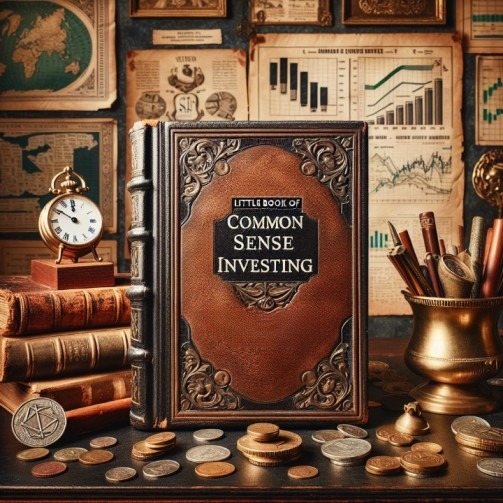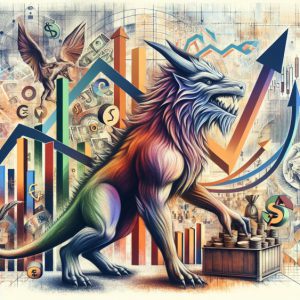
Little Book of Common Sense Investing: Uncommon Sense for Smart Investors
May 16, 2024
Introduction: Navigating the Labyrinth of Financial Markets
Searching for a single comprehensive guide frequently leads to frustration in the often confusing financial markets. Experts sometimes inadvertently obscure it further in their attempts to illuminate the path. These self-proclaimed wizards of finance rely on the participation of a gullible multitude, fueling their profits through the confusion they perpetuate. Yet, for those who tread the path with the right companion, the journey can be both enlightening and profitable.
Often seen as the titans of market strategy, hedge funds struggle with market volatility. Their attempts to outmanoeuvre market forces can lead to significant repercussions. Consider the case of Valeant Pharmaceuticals, where followers of misguided expert advice led astray, demonstrating the dangers of blind trust in so-called financial wizards.
Despite the treacherous landscape, a beacon of reason exists common sense investing principles. In his “Little Book of Common Sense Investing,” John Bogle’s philosophy advocates simplicity and prudence. His approach, grounded in enduring truths, offers a steady hand in turbulent times.
Little book of Common sense investing and Mass Psychology
Successful investing requires more than common sense; it demands an understanding of mass psychology. Markets are driven by collective emotions—fear, greed, and hope—creating waves of sentiment that can lead to irrational exuberance or despair. As Jonathan Swift aptly said, “When a true genius appears in the world, you may know him by this sign, that the dunces are all in confederacy against him.” Recognizing these emotional undercurrents can provide a strategic advantage.
Contrarian insights from behavioural finance reveal that disciplined investors can identify undervalued opportunities during a market panic. As Warren Buffett advises, “Be fearful when others are greedy and greedy when others are fearful.” This contrarian approach, however, must be balanced with prudent risk management and diversification to mitigate volatility.
The Wisdom of Diversification and Patience: Lessons from Market Psychology
Diversification is critical to managing risk. A well-balanced portfolio that includes quality blue-chip stocks can provide resilience during market downturns and participate in recoveries. Rebalancing ensures discipline, preventing overconcentration in any single asset. Charlie Munger’s wisdom reminds us, “The big money is not in the buying and selling but in the waiting.”
Investing requires resilience that is stronger than greed or fear. Sensational promises of easy money often lead to risk. True investing success lies in focusing on quality assets and maintaining discipline. Patience and prudence are essential, allowing for participation in long-term growth rather than chasing fleeting trends.
A prime example of the importance of diversification and patience is the 2008 financial crisis. Investors who diversified their portfolios with a mix of stocks, bonds, and other assets fared better than those heavily invested in real estate or financial stocks. By maintaining a diversified portfolio, these investors could weather the storm and participate in the market recovery.
Mass psychology also plays a crucial role in market dynamics. During the dot-com bubble of the late 1990s, the collective euphoria surrounding internet-based companies led to skyrocketing stock prices, often detached from fundamental valuations. Investors driven by the fear of missing out (FOMO) poured money into tech stocks, pushing valuations to unsustainable levels. The bubble burst in 2000 resulted in massive losses for those who had followed the herd without considering the underlying fundamentals.
In Steppenwolf, Herman Hesse captures the essence of human behavior, noting, “The bird fights its way out of the egg. The egg is the world. Who would be born must destroy a world.” This metaphor relates to the investor’s journey: breaking free from the irrational exuberance of the crowd and finding clarity through disciplined investing.
Similarly, the 2008 financial crisis showcased the power of mass psychology in reverse. Fear and panic spread rapidly, leading to a massive sell-off in global markets. Investors who understood the emotional contagion and herd mentality were able to identify undervalued opportunities amidst the chaos. For instance, Warren Buffett’s decision to invest in Goldman Sachs during the height of the crisis was calculated based on his understanding of market sentiment and long-term value.
As Hesse suggested, breaking free from the prevailing sentiment allows investors to see beyond the immediate chaos and focus on long-term value creation.
Lessons from Notable Investors
Jack Bogle and Warren Buffett exemplify the success of a patient and conscientious approach. Bogle’s advocacy for low-cost index funds through Vanguard revolutionized investing by emphasizing broad exposure over speculative strategies. His belief in the power of passive investing has led countless investors to achieve stable, long-term gains. Bogle’s philosophy underscores that simplicity often trumps complexity in the investment world.
On the other hand, Buffett focuses on undervalued companies and maintains a long-term perspective, making him one of the most successful investors. His strategy is rooted in thorough research and a deep understanding of business fundamentals, allowing him to identify and invest in high-quality companies that others might overlook. Buffett famously advises, “It’s far better to buy a wonderful company at a fair price than a fair company at a wonderful price,” highlighting his commitment to value investing.
Jeremy Grantham, known for his accurate predictions of market bubbles, faces challenges in the current elongated bull market. Despite short-term underperformance, his adherence to valuation discipline underscores the importance of maintaining principles in the face of market pressures. Grantham’s insights remind investors that while market timing is challenging, sticking to a well-founded investment philosophy can yield long-term benefits. His focus on long-term valuation rather than short-term gains offers a counterbalance to the often speculative nature of the market, reinforcing the value of patience and prudence in investment decisions.
Harnessing Mass Psychology
Investors can enhance their chances by understanding the cycles of market sentiment. Measuring the intensity of emotions among different investor groups and waiting for signs of capitulation can help identify optimal entry points. Flexibility and an open mindset are essential, allowing adjustments based on evolving sentiment and market conditions.
A prime example of mass psychology at work is the dot-com bubble of the late 1990s. During this period, the collective euphoria surrounding internet-based companies led to skyrocketing stock prices, often detached from fundamental valuations. Investors, driven by the fear of missing out (FOMO), poured money into tech stocks, pushing valuations to unsustainable levels. The bubble burst in 2000 resulted in massive losses for those who had followed the herd without considering the underlying fundamentals.
Similarly, the 2008 financial crisis showcased the power of mass psychology in reverse. As the housing market collapsed, fear and panic spread rapidly, leading to a massive sell-off in global markets. Investors who understood the emotional contagion and herd mentality were able to identify undervalued opportunities amidst the chaos. For instance, Warren Buffett’s decision to invest in Goldman Sachs during the height of the crisis was calculated based on his understanding of market sentiment and long-term value.
By studying these historical examples, investors can learn to recognize the signs of extreme market sentiment and make more informed decisions. This approach helps identify potential entry and exit points and maintain a disciplined investment strategy that can withstand the market’s emotional swings.
Concluding Thoughts: Little Book of Common Sense Investing
*In the ever-evolving world of investing, mass psychology and understanding collective market sentiment should be the foremost guiding principles for any investor. Despite their experience and knowledge, experts are not immune to emotional biases and herd behaviour. True insight comes from observing the actions and sentiments of the masses rather than relying solely on pundits’ proclamations.
As Machiavelli noted, “The wise man does at once what the fool does finally.” This underscores the importance of recognizing and acting on market sentiment extremes to position oneself advantageously. Historical examples, such as the dot-com bubble and the 2008 financial crisis, illustrate how emotional contagion and herd mentality drive market movements more than fundamental analysis alone.
Investors can navigate market cycles more effectively by monitoring sentiment indicators and recognizing when emotions reach boiling points. Herman Hesse captures this essence of human behaviour in “Steppenwolf,” noting, “The bird fights its way out of the egg. The egg is the world. Who would be born must destroy a world.” This metaphor aptly describes the investor’s journey of breaking free from the irrational exuberance of the crowd to find clarity and make disciplined investment decisions.
Ultimately, mass psychology ensures it is not merely what experts think that shapes market realities but the collective mindset of investors. By adopting an open, flexible, and dynamic approach informed by sentiment gauges, investors can improve their odds of long-term success. Understanding and harnessing the power of mass psychology allows for alignment with actual market cycles, providing a more reliable path to sustained investment performance.
Discover Exceptional and Informative Reads

How To Get Financial Freedom Fast: Escape the Herd for Lasting Success

Giving Content to Investor Sentiment: The Role of Media in The Stock Market

Considering the impact of inflation, Why Is Investing Important?

Technical Analysis of Stocks and Commodities: Unveiling Insights

Why Is the US Education System So bad: Rubbish In, Rubbish Out Phenomenon

Investor Sentiment in the Stock Market Journal of Economic Perspectives

Mass Psychology of Fascism: Unmasking Bombastic News

Identifying Trends and Buying with Equal Weighted S&P 500 ETF

Real Doppelgangers: The Risks in the Age of AI

The Intelligent REIT Investor: How to Build Wealth with Real Estate Investment Trusts

TGB Stock Forecast: Rising or Sinking

Stock Market Crash Date: If Only The Experts Knew When

Reasons Why AI Is Bad: The Dark Truth?

The Inflationary Beast: Understanding What Inflation is and What Causes It

Carnosine Benefits: An Antioxidant for Health, Longevity, and Disease Prevention
Stock Market Correction History: Decoding Illusions Behind Crashes


